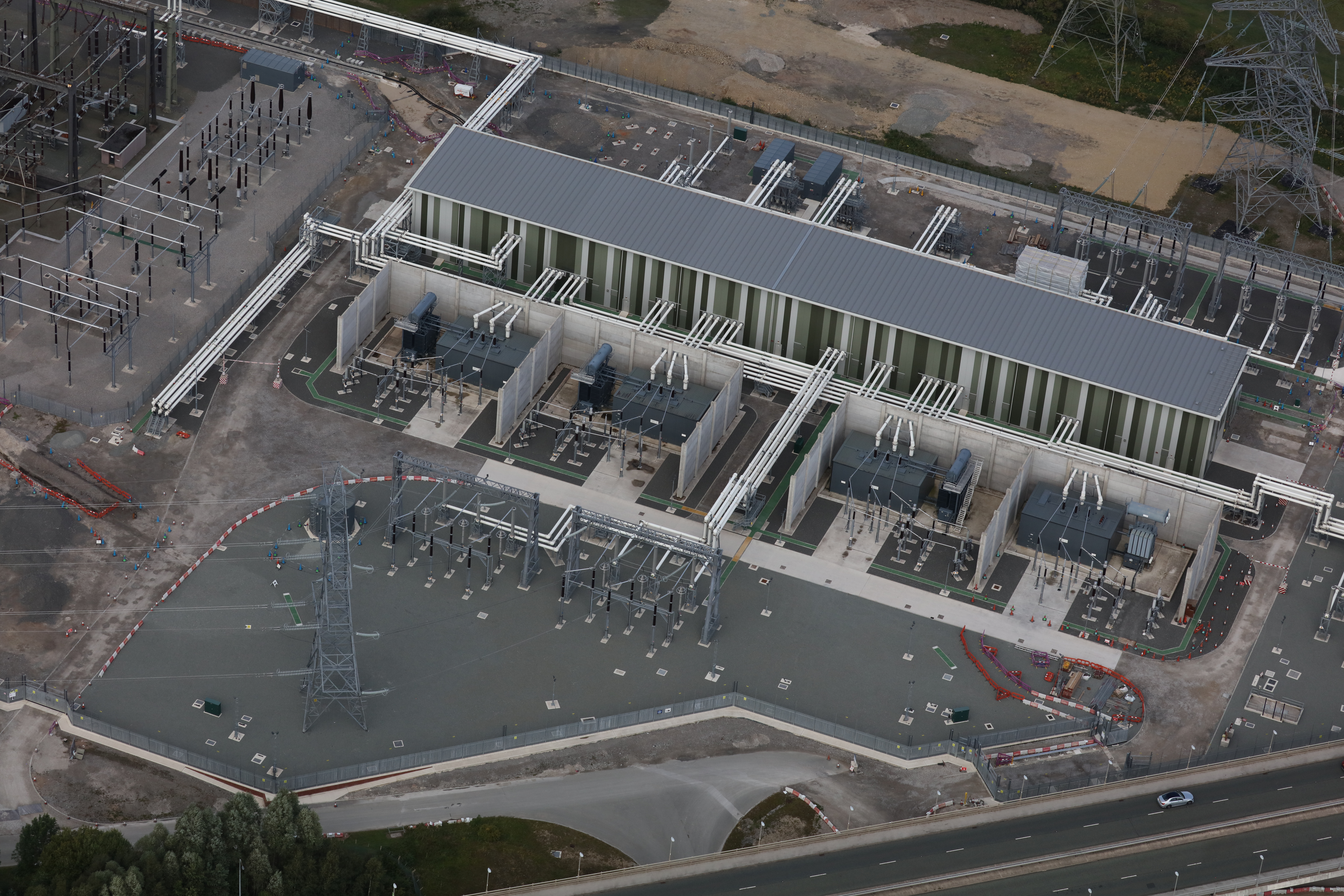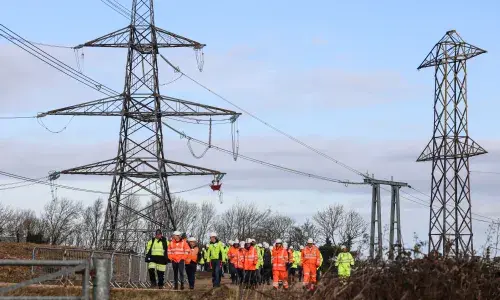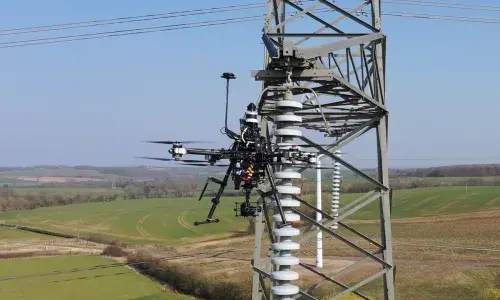
Ofgem funding granted for three projects to accelerate network innovation towards net zero
National Grid Electricity Transmission (NGET) has been granted the Strategic Innovation Funding by Ofgem, the energy regulator, for three innovation projects that will accelerate Great Britain's progress towards delivering a net zero energy network at the lowest cost to consumers.
The Strategic Innovation Funding (SIF) is delivered in partnership with Innovate UK, part of UK Research and Innovation (UKRI) and aims to find and fund ambitious, innovative projects with the potential to accelerate the transition to net zero.
The Discovery is the first phase of a three-phase SIF competition grant focused on a solution feasibility study to identify challenges and benefits to end consumers. Funding has been awarded for £400k and successful delivery of this phase opens an opportunity to receive further funding in Alpha and Beta phases to develop and demonstrate the solution.
National Grid Electricity Transmission projects
Sustainable Electrical Gas Insulation Lines (SEGIL) Project
NGET, in collaboration with its partners have been awarded £133k to investigate a feasibility of a SF6 free Gas Insulated Line (GIL) solution to provide high-capacity transmission connections over 2000MVA to increase available network capacity for new offshore wind generation.
Current generation of GIL are filled with a sulphur hexafluoride (SF6), a potent greenhouse gas that is 23,000 times more environmentally harmful than CO2. The project will look at the options to replace SF6 with alternative low carbon footprint gases as a viable means of GIL insulation. The solution will have much lower visual impact and faster capacity delivery than overhead lines and is expected to be more cost effective than cable systems thanks to lower construction and equipment costs.
The project falls under the innovation challenge of ‘Whole system integration and decarbonisation’, addressing current and future heat, power, and transport energy requirements and new approaches to infrastructure investment to maximise efficiency in large-scale network and system investments by taking systems view across generation and demand side changes linked to decarbonisation.
Super Conductor Applications for Dense Energy Transmission (SCADET) project
This Discovery Phase project awarded £148k, will be led by NGET with support from partners to develop an understanding of the barriers, opportunities, and benefits of modernising existing electricity infrastructure by replacing conventional cables with the use of High Temperature Superconductor (HTS) cable technology to increase network capacity in the urban environment.
HTS cables have three to ten times higher power density than conventional cable systems, meaning they deliver higher capacity at lower voltage levels and via a lower number of routes. Lower voltage substations have smaller footprint, which is very beneficial for densely populated areas. HTS technology will allow faster network capacity increase, delivering time, cost, and carbon savings with reduced energy losses and wider environmental benefits including reduced disturbance to local communities caused by construction activities.
The project aims to deliver benefits for ‘whole system integration and decarbonisation’ by facilitating electrification of current and future needs for energy provision for heat, power, and transport while reducing the carbon impact of electricity system and evaluating the costs and opportunities of repurposing existing infrastructure and/or assets, such as existing cable routes, tunnels and substations, leading to lower costs for upgrading infrastructure with HTS cabling.
Eye in the Sky Project – using satellite data to improve grid resilience in emergency
In collaboration with partners, the Eye in the Sky project team, awarded £119k, will investigate new satellite data analytics solutions that can help GB networks to improve the visibility of infrastructure and assets, response in emergency and assess effects of climate change.
By assessing how novel uses of data and digital platforms can significantly improve network planning, modelling and forecasting capabilities, the team aim to use the satellite data to improve the response to climate change effects like flooding, strong wind, snow storm or wildfire and provide warning to the networks for better planning and resource allocation during extreme weather events.
The final solution should significantly reduce the requirements for manual ground and aerial based monitoring. This would allow the GB networks to be better informed about the network conditions and more reliable while lowering emissions and costs associated with operation and maintenance activities.
This is closely aligned with the ‘Data and Digitalisation’ challenges, aimed to improve data monitoring, increase efficiency, reliability, security, and resiliency of networks.
The key outcome is that networks will benefit from more frequent risk assessment, faster response in emergency, and optimised resource allocation and infrastructure development planning. Consumers will benefit from higher grid reliability, lower cost for emergency response and faster system recovery.
Alexander Yanushkevich, National Grid Electricity Transmission's Innovation Manager, said: "These ambitious, innovative projects have the potential to shape the future electricity network, accelerating the transition to net zero at the same time as delivering significant benefits to consumers. The most successful of the feasibility study projects can go on to receive further funding and we look forward to taking each project forward and helping these new technologies become a reality."
Partnerships
Sustainable Electrical Gas Insulated Lines (SEGIL) Project Partners
Lead partner is National Grid Electricity Transmission (NGET). Additional project partners are:
-
Ørsted as a windfarm developer and generation licence holder.
-
Scottish Power Transmission (SPT) and National Grid Electricity System Operator (NGESO) as networks owners and operators.
-
General Electric (GE) as the GIL technology provider.
-
J. Murphy & Sons as civil construction expert and EPC.
-
University of Manchester as an academic partner and expert in HV assets and SF6 replacement.
-
Frazer-Nash Consultancy (FNC) as techno-economic assessment experts.
Super Conductor Applications for Dense Energy Transmission (SCADET) project
Lead partner is National Grid Electricity Transmission (NGET). Additional project partners are:
-
NGET, WPD, SPT, UKPN, Ørsted as transmission and distribution network owners and generation.
-
Nexans and AMSC as technology providers:
-
Strathclyde University and University of Manchester as Academic partners who will use their technical excellence in power system technologies to assess the opportunity for solution development and provide the technology roadmap.
-
Frazer-Nash Consultancy (FNC) as techno-economic assessment experts.
Eye in the Sky – using satellite data to improve grid resilience in emergency Project
-
NGET and NGGT as network owners and operators
-
Spottitt as an expert in satellite data analytics and technology provider
-
European Space Agency as data provider and owner of satellites and data
-
Cranfield University as Academic partner and expert in aerospace technology and innovations



